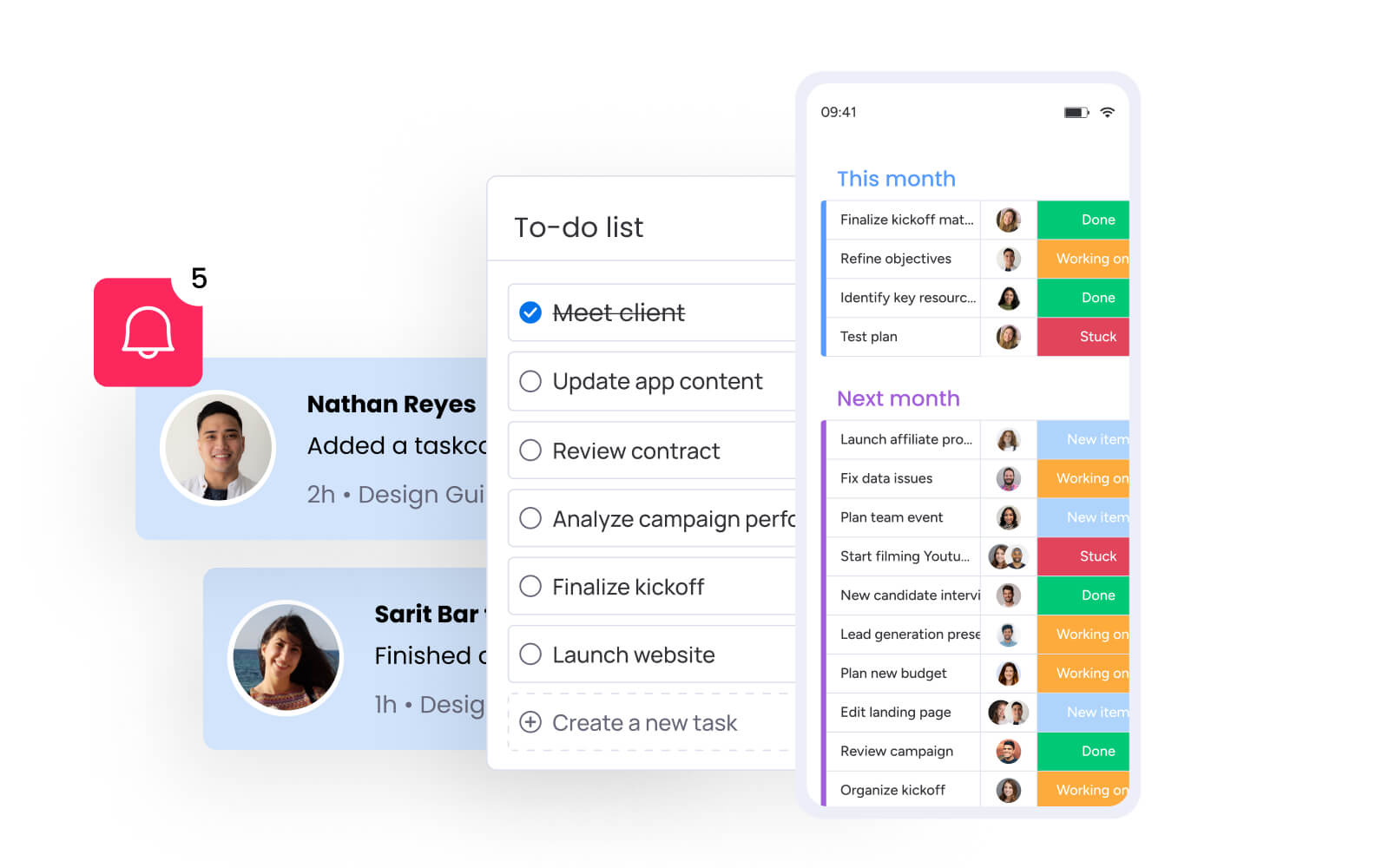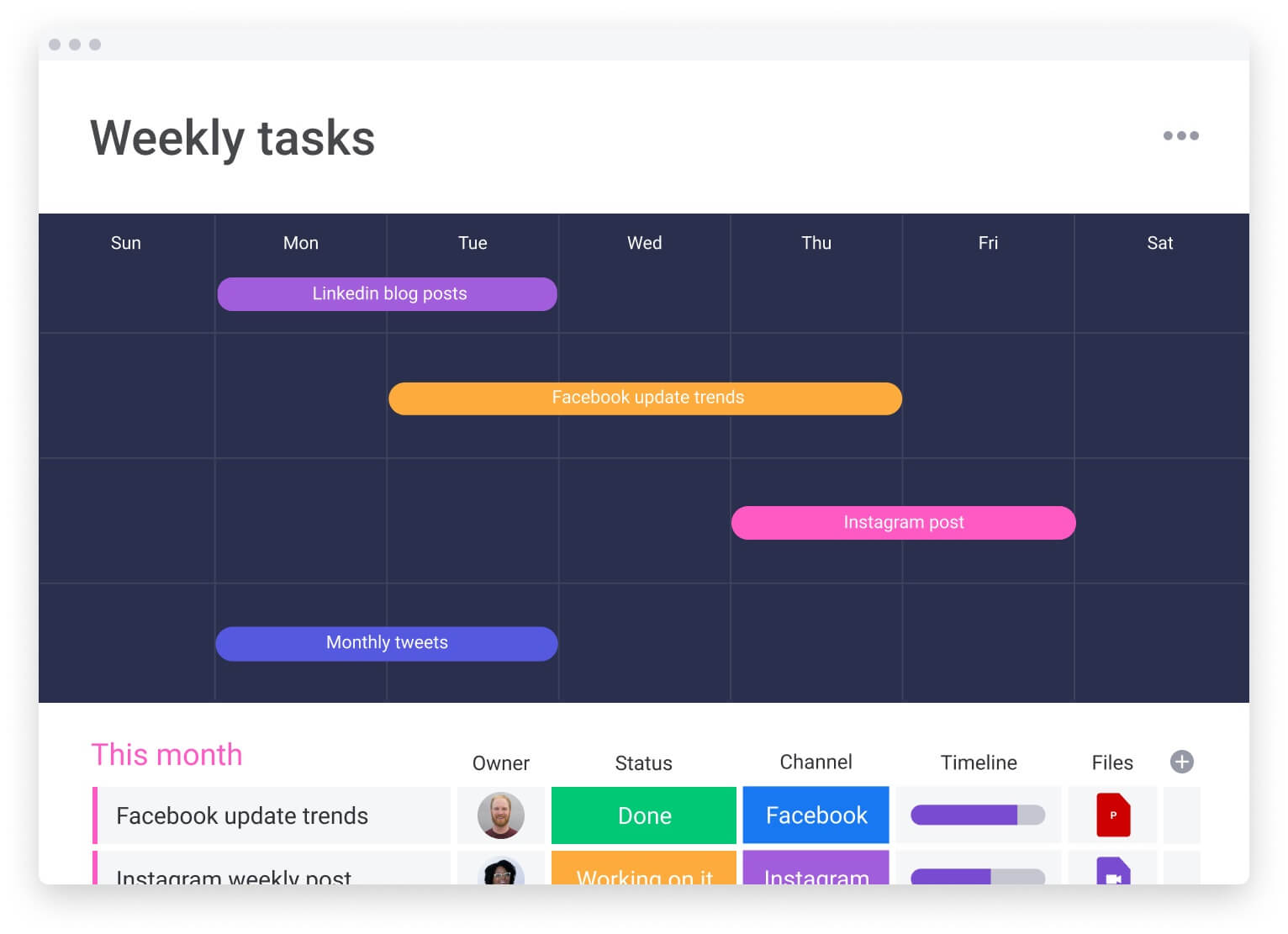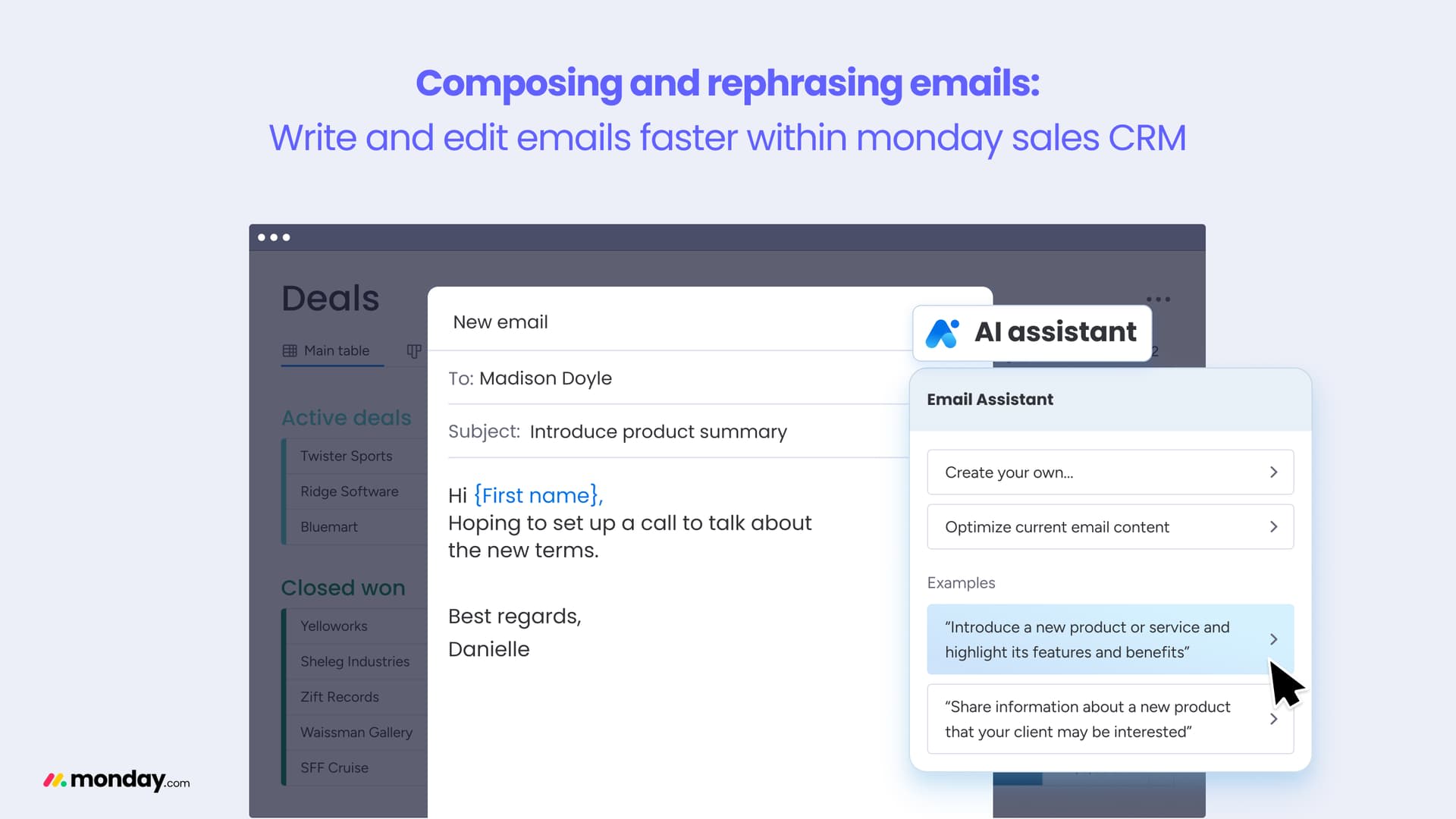Let’s get one thing straight: a successful morning routine starts with a good night’s sleep. First and foremost, it’s important to make sure you’re getting enough sleep so you can start your days off on the right tone.
Once your bedtime routine and sleep schedule is sorted, the next step is perfecting a regular morning routine. A good morning routine looks different for everyone and depends on what you feel you need to set yourself up for a productive day.
This post will give you some top expert-proven tips to incorporate into your personal morning routine. We’ll look at different things you can do each morning to make sure you’re focused, efficient, and ready to take on anything the day throws at you. We’ll also take a look at how using a platform like monday.com can help you organize your day in a way that fits your natural rhythm.
Get started1. Don’t fall into the snooze trap
We’ve all been there before: you set your alarm clock for a reasonable hour and then end up snoozing once…twice… and suddenly you’re jumping out of bed almost an hour late. It takes time, practice, and discipline, but breaking the habit of hitting the snooze button will change your mornings for the better.
According to a survey, 57% of people regularly hit snooze, but those few extra minutes of sleep aren’t going to help you feel more rested or alert. The sleep you get between snoozes is disjointed and disturbed and won’t have a long-lasting effect on your day. Instead of multiple snoozes, try these tips instead:
- Put your alarm out of arm’s reach so you’ll need to get out of bed to turn it off
- Wake up around the same time every morning so your body naturally feels more alert at the same time
- Don’t leave time in your morning routine to press snooze so you’re less tempted to stay in bed
- Consider natural or artificial light sources to help your brain wake up when you need to
2. Make your bed first thing in the morning
It can be tempting to leave your blankets in a heap and your pillows on either end of the bed, but multiple studies show us that making your bed each morning has many benefits, which is why so many successful people are known to do it. Here’s how:
- Making your bed is tied to positive mental health benefits, like a sense of accomplishment, calm, and better organization
- Mindful practices like getting into the morning habit of making your bed can make you feel less anxious and stressed
- Making your bed is thought of as the first task that you’ll accomplish in a day, setting the tone for the rest of the day
- Getting into a tidy and neat bed at night is a lot more inviting and can help you sleep better
3. Get some morning movement
Studies show that people who exercise in the morning feel 69% more productive than those who exercise in the evening. They’re also 129% more likely to believe that their workout positively impacts their productivity. While all exercise is good no matter the time of day, getting moving in the morning is a great way to control your stress levels, feel more focused, and stay motivated.
Even if you don’t have time for a full-blown workout like a run or a gym session, a quick yoga flow or stretching session at home can also go a long way to preparing yourself for the rest of the day.
4. Don’t forget to hydrate
Naturally, your body loses water as you sleep, so instead of reaching straight for the coffee machine in the morning, first drink a full glass of water to hydrate. Aside from rehydrating, there are studies that show that drinking water first thing in the morning can benefit you both physically and mentally in different ways:
- Gets your metabolism started
- Promotes digestion
- Improves your skin
- Provides a boost of energy
- Improves mental performance
5. Meditate or practice breathwork
A moment of mindful practice can go a long way in the morning. Studies show that there are many benefits to turning your attention inward in the morning, such as improved concentration, focus, and self-awareness. According to data from meditation app users, people who meditate in the mornings are more likely to maintain the habit over time.
For some people, breathwork might be a better fit than meditating. Practicing breathwork in the morning can help alleviate stress and make you feel more energized. There are different breathing techniques you can use, so finding the right one for you and practicing it every morning can get you into a solid routine.
6. Plan out your day before it starts
Before heading out to work or sitting at your desk, take a few moments to plan out your day. This could be creating a to-do list for tasks you need to prioritize at work, errands you need to run, or reminders of meetings or events you may have to attend.

Keep your day plan organized with a daily planner on a platform like monday.com, where you can quickly jot down events, tasks, and reminders. You can use monday.com on the go with the mobile app and even set times and dates and create quick automations so that you get notified before a task is due or about an upcoming meeting for better time management when you’re busy.
Get started7. Don’t skip breakfast!
We’ve been reminded since we were kids to never skip breakfast, yet more than a quarter of us still do on a regular basis. A balanced breakfast of fruit, vegetable, protein, carbohydrate and healthy fat, offers plenty of health benefits that go beyond kickstarting your metabolism. There are a number of other mental benefits, too, such as:
- Boosts energy levels
- Better mood
- Improves ability to concentrate
- Gives your brain fuel to function
8. Focus your thoughts in a journal
Like a number of other morning rituals on this list, journaling is a great way to practice being more present, self-aware, and setting a goal or intention for your day. By focusing your thoughts first thing in the morning in a journal, you’ll have an easier time focusing on work and whatever else you need to get done throughout the day. To make the most of your morning journaling, here are a few tips:
- Find a comfy spot that’s distraction-free
- Don’t focus on writing rules, write your thoughts as they come out
- Commit to filling a set number of pages every morning
- Set yourself a minimum or maximum time limit
9. Be intentional about your screentime
It’s difficult to entirely avoid screen time these days as we’re so focused on our devices, whether it’s a computer, phone, tablet, or television. In the morning, try and limit the amount of time you’re looking at a screen.
If you use your phone to use apps for mindfulness, meditation, or day planning, get into the habit of accessing those apps only instead of checking the news, your notifications, or scrolling through social media. If you find this difficult to do, set yourself a new challenge: for 30 days, commit to no screen time for the first hour after you wake up.
10. Set yourself up to minimize distractions
It takes on average 23 minutes and 15 seconds to get refocused and resume the same levels of productivity when you get distracted while working. Distractions can come in many forms, such as scrolling through apps, responding to emails, or even entertaining your children if you’re working from home. It’s also hard to avoid distractions entirely, so it’s better to try and minimize them or set yourself up to refocus quickly rather than completely avoid them. Here are a few tricks you can use to do that:
- Turn off alarms, ringtones, or noises that can break your focus
- Use platforms like monday.com to track tasks so you always know what you need to focus on next when you get sidetracked
- If you focus better with music, pick a playlist that will help keep you in the zone
- Use time-blocking or the Pomodoro technique to work at set intervals
- Try to make sure you’re working in a quiet and neat environment
- Avoid trying to multitask and instead focus on one thing at a time
11. Spend a few minutes being creative
This may seem like something superfluous in the mornings, but spending just a few minutes on a creative pursuit can impact your happiness levels and mental health. Studies show that being creative releases dopamine and serotonin, which can improve your mood, help you think more divergently and creatively, and maintain a positive mindset in challenging situations.
So, if you have an important sales meeting in the afternoon, spending a few minutes in the morning painting, sketching, dancing, or even journaling can help you nail your pitch more than you’d expect.
Start your day off right with monday.com
You might assume that a platform like monday.com is just for teams working together, but the truth is the platform can fit a variety of needs, including day planning and scheduling just for one person. One of monday.com’s key products – monday work management – is a customizable project and work management platform that can also be fitting for day and task planning for individual users. With a flexible day planner, scheduler, and platform to send you important reminders, you can spend just a few minutes at the start of your day or week to make sure you’re productive and on track each day.

With monday.com, there are a number of different features that help you build a conducive morning routine, such as:
- A daily work schedule template to help you stay on top of your work tasks
- Plan out your entire day by time-blocking with a 24-hour schedule template
- Create custom no-code automations to get reminders for important tasks, events, or meetings
- Add color-coded labels to plan out your day and set priorities for different tasks
- Integrate over 200+ third-party apps including Zapier so you can integrate time management tools like apps for Pomodoro technique timing
- Use monday.com’s built-in time-tracking feature to determine how long you spend on tasks and stay focused
- Organize your workload for the day so you know exactly what you need to focus on each morning at a glance
- Mobile app to get notifications, access tasks, and jot down notes on the go
- Use monday.com’s AI assistant to quickly respond to emails so you can speed through smaller, more repetitive morning tasks

For individual users, monday.com offers a free plan that will give you access to basic features for planning out your day, making it a great choice for anyone who wants to start integrating organizing their days and weeks into their morning routine.
Get startedBuild your own custom morning routine
There isn’t one perfect morning routine. By finding a combination of the things we mentioned above, or others, you can test out what works for you. If you’re not a morning person, you may want to try starting with just one new morning ritual and gradually adding in new ones. To stay organized and keep track of everything you need to accomplish in a day, we recommend using a tool like monday work management to make your morning easier, and your entire day a success.
FAQs
What is a good morning routine?
A ‘good’ morning routine will look different for everyone. Some people like to spend an hour on their morning routine alone to start their day, while others prefer a condensed version and then diving straight into work. The best routine is the one that fits your schedule and that you can commit to doing every day.
What is the best routine when you wake up?
Each individual’s morning routine will look different, but there are some staples that everyone will include: avoiding your alarm’s “snooze” button, eating a balanced breakfast, hydrating, and adding a morning ritual like meditating, breathwork, journaling, or movement.
How to start an early morning routine?
To start a brand new early morning routine, start by first getting into the habit of waking up earlier so you don’t feel stressed about time. Then, slowly add in one new part of your routine every week until you feel satisfied with your early morning routine.
Is it healthy to wake up at 5 am?
It’s neither healthy nor unhealthy to wake up at 5 am, it depends entirely on how much sleep you got over the night. As long as you get the recommended minimum of 7 hours of sleep, waking up at 5 am can give you ample time to fit in a solid morning routine. It’s more important to prioritize sleeping enough than focusing on what time you wake up.
 Get started
Get started 
